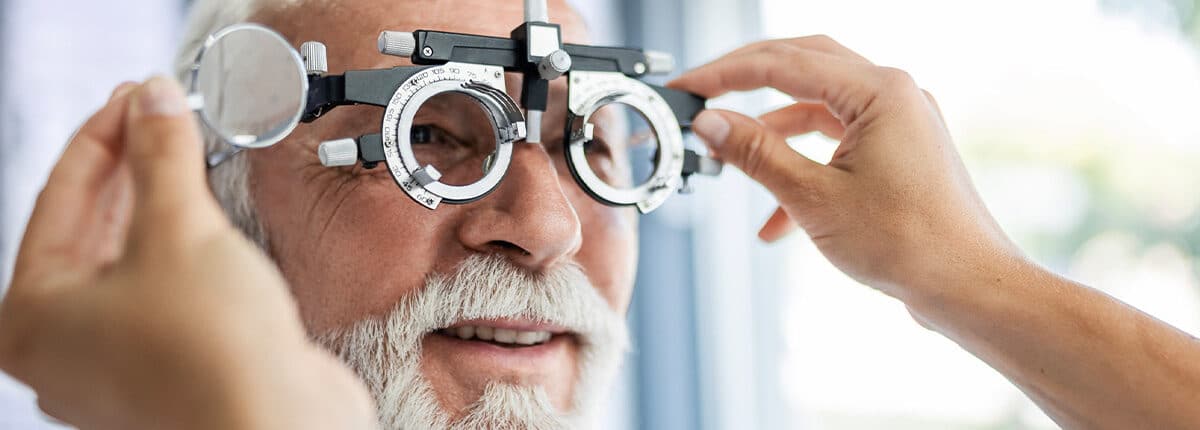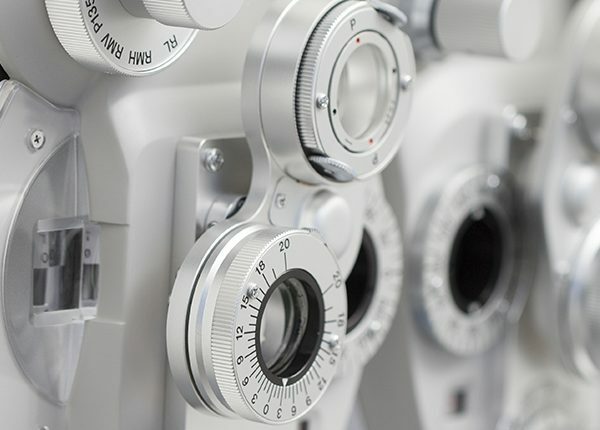
The Lifesaving Importance of Regular Eye Exams: Here’s Why You Shouldn’t Miss Them
15 APR 2024
Eye conditions Eye health
Regular eye exams are just as important as any other type of medical check-up, such as visiting your dentist or your GP. “But I don’t even need glasses or contact lenses,” you may think. “My eyesight is perfect!” Alternatively, you may already have glasses or contact lenses, and don’t see the need to book an eye exam when you’re satisfied with your current prescription. While this may be the case, eye exams actually do more than check your eyesight—the secondary purpose of eye exams is to also monitor for signs of broader health issues. Early detection of these issues could even save your life.
The vital role of routine eye examinations
By making regular eye exams a part of your year-round health routine, you’re not only protecting your vision, but proactively maintaining your overall health. Here’s how routine eye exams can help you maintain your eye health.
1. Spotting early signs of vision problems
Optometry professionals are trained to spot the early signs of vision problems, which can affect various aspects of your visual function, including distance vision and peripheral vision. Through a routine eye examination, optometrists can identify issues that might not yet be obvious to you. Early detection allows for prompt management, helping to maintain your quality of vision and prevent further deterioration.
2. Tailored solutions for vision correction
One of the key benefits of regular eye exams is the opportunity for timely updates to your prescription glasses and
contact lenses. As your vision changes, which it inevitably does over time, these adjustments are crucial for maintaining optimal vision. Regular eye exams mean that you have the best prescription for your glasses or contact lenses.
3. Early detection of eye conditions and diseases
Identifying and assessing eye conditions at an early stage through routine eye examinations is crucial for the effective management and treatment of various conditions. These examinations allow optometry professionals to detect signs of conditions that, without timely intervention, could lead to significant and irreversible vision loss. Early detection is key to managing these conditions effectively, as it can allow for timely treatment and help prevent or slow down the progression of vision loss. Below are key eye conditions that routine examinations can help prevent or mitigate:
- Glaucoma: A group of eye conditions that damage the optic nerve, critical for good vision, and often associated with a buildup of pressure inside the eye. Early detection treatments for glaucoma lower eye pressure and prevent significant optic nerve damage.
- Macular Degeneration: A disease that causes blurring or loss of vision in the centre of the visual field, which is important for activities like reading and driving. Early intervention cannot stop this issue, but it can significantly slow its progress.
- Diabetic Retinopathy: A diabetes complication that affects the eyes, caused by damage to the blood vessels of the light-sensitive tissue at the back of the eye (retina). Diabetic retinopathy can be managed more effectively when caught early, potentially preventing severe vision loss.
- Cataracts: Clouding of the eye’s lens that leads to a decrease in vision, which can develop slowly and affect one or both eyes. Cataracts are identified during routine exams, and their progression can be monitored for potential surgical removal when they significantly impact vision.
- Dry Eye Syndrome: A common condition that occurs when the tears aren’t able to provide adequate lubrication for the eyes. Dry eye syndrome can be managed with various treatments once identified, improving comfort and preventing potential damage to the eye’s surface.
How eye exams can save lives
Did you know that many common diseases first present indicators within the eye? This means that early detection—and therefore, early intervention—is possible through a simple, routine eye exam. This reduces the risk of severe complications and emphasises the importance of regular eye exams. The following common diseases can be detected early during a routine check-up.
Diabetes
Early signs include changes in blood vessels in the retina, which can lead to diabetic retinopathy. Identifying diabetes in its initial stages allows for immediate management strategies to be put in place, such as blood sugar control and lifestyle modifications.
Hypertension
Blood vessel damage in the eye may indicate high blood pressure, often without any other symptoms. Early detection of hypertension can be managed effectively through medication and lifestyle adjustments. This not only helps in preserving eye health, but also reduces the risk of heart attacks, strokes, and kidney problems, significantly enhancing life expectancy.
High cholesterol
Indicators include changes in the blood vessels of the eye or the presence of plaques in the retina. Early detection of high cholesterol through signs in the eye vessels can prompt dietary and lifestyle changes alongside medical treatment to lower cholesterol levels. This can prevent more severe cardiovascular diseases, such as heart attacks and strokes.
Autoimmune disorders
Certain eye conditions, such as uveitis, can suggest an underlying autoimmune disorder. The early identification of autoimmune disorders through eye symptoms allows for timely immunosuppressive therapy, which can control inflammation and prevent tissue damage. In the long run, this can help to reduce the severity of the disorder and the risk of complications, improving the patient’s quality of life.
Thyroid diseases
Eye symptoms, such as bulging eyes or Graves’ ophthalmopathy, can indicate thyroid issues. The early, effective management of thyroid function can alleviate eye symptoms and prevent the progression to more severe conditions, such as vision loss or thyroid storm—a life-threatening state of hyperthyroidism.
The potential risks of neglecting regular eye exams
Nobody really likes going to the dentist. But you book yourself in for regular appointments because you know that checkups can prevent much larger problems later on down the track—such as an expensive crown or even an extraction.
You should treat eye exams in the same way. Regularly booking a routine eye exam can help in the early detection of various eye diseases as well as broader health issues, such as multiple sclerosis, diabetes, raised blood pressure, auto immune conditions, or even sleep apnoea. If these health issues are not detected early, then they can progress to a point where treatment options become more limited.
How often should you see your optometrist?
At Eyecare Plus, we recommend that adults have an eye test at least once every two years. For those over 50, an eye test should be booked at least once every year. When it comes to young children, we recommend testing them at ages 1, 3 and 5. At the very least, children should be tested before they start school. This ensures that any disadvantageous vision problems are detected before your child enters the classroom.
If you have further questions about eye tests and what to expect at an Eyecare Plus eye exam, then make sure you check out our eye test FAQ page.
Book an eye exam today with Eyecare Plus
The optometry professionals at Eyecare Plus are dedicated to providing you with the highest level of customer service. We are committed to delivering clinical excellence, which is why we offer Checkup Plus™ eye examinations. These exams generally last for 30 to 45 minutes, and will test for a range of issues, including cataracts, diabetic retinopathy, macular degeneration, glaucoma, and general physical health.
Find your local Eyecare Plus optometrist and book an eye exam today
Book an appointment with
your local Eyecare Plus
Optometrist today.

